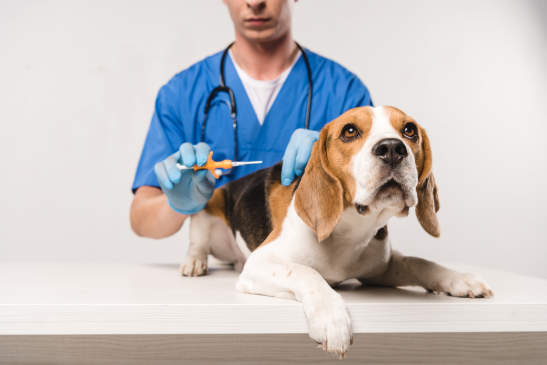Having a dog feels like having another member of the family. Unlike a member of the family, however, dogs regularly have the instinct to wander or run off and get lost. And, when they do, they don't have the ability to communicate to anyone who they are or where they came from. To help ensure that you don't ever lose track of your furry friend (heartbreaking!), there are some helpful steps you can take, including getting your dog microchipped. A microchip can help permanently keep information about your dog and you (his owner) attached to him, so that if your dog does run off or get lost, people have a way to figure out who he is. Then, they can can return him home safely if they simply known how to get a microchip read.
If you want to figure out whether you should get your dog microchipped, read on. You can understand more about what a microchip is, how it is inserted into your pup, and the benefits of having doing it for your dog.
What is a dog microchip?
A microchip is a small electronic chip enclosed in a glass cylinder. That chip transmits a radio wave. The radio wave can be scanned and it has an ID number associated with it. There are national pet recovery databases where you can register your dog's ID number. You also register your contact information associated with that ID number. That way if your pet is lost and someone finds it, they can take it to a vet or shelter, have it scanned then determine that the pet ran away from you. This is a safe and dependable way to find lost pets if they ever run away from home. According to the American Veterinary Medical Association (AVMA), there are more high-tech microchips that are often used by experts at places like zoos, or where researchers do studies of animals. These microchips can collect things like body temperature.

How does microchipping a dog work? Is it painful?
According to the experts at the AVMA, the process of microchipping your dog is almost completely pain-free for your pup. It is just as routine and simple as giving your dog a vaccination at a routine veterinary visit. Your vet will simply inject the microchip with a hypodermic needle in the loose skin near your dog's shoulder. The process does not require any surgery or anesthesia. However, some pet owners choose to get their dog microchipped during other medical procedures that do require anesthesia so that the chip is inserted while the dog is asleep.
This is often done during a spaying or neutering procedure, or if your dog is asleep to have his teeth properly brushed and cleaned at the vet's office. A microchip can stay in your dog for a long time, and unless your dog lives longer than a normal dog's lifespan, it will last the entirety of his life. Experts at the Humane Society say that most microchips are designed to last and work in your pup for around 25 years.
How do you register your dog's microchip?
If you do get a microchip inserted into your dog, there's another essential step to take if you want to ensure that that microchip is helpful: registering it. There are several different registries where you can link your contact information to your pet. Some of the most popular are listed here, in this directory compiled by the Animal Humane Society.
One thing to note is that if you are given a pet who is already microchipped or if you adopt a pet with a microchip, you don't have to live with the pet's former owners' contact information. You can go re-register the same microchip and ID number with your contact information. Also, you should always make sure that you update the information associated with your microchip if you move or change contact numbers. You want to ensure you change your contact information everywhere that the microchip is registered.
Are microchips safe for dogs?
There are some risks associated with microchipping your dog. These complications are extremely rare, but are something to be aware of. The microchip can be implanted incorrectly. There have been studies conducted to determine whether cancerous tumors developed near the dogs' implant sites were caused by the microchip, but the results are inconclusive. The American Veterinary Medical Association explains, "The risk that your animal will develop cancer due to its microchip is very, very low, and is far outweighed by the improved likelihood that you will get your animal back if it becomes lost."

What are the benefits of microchipping your dog?
If you are wondering: should I microchip my dog? It is worth considering all of the benefits of microchipping. Here are some of the benefits to using this technology with your dog.
Find your lost dog
This is the main benefit of microchipping your pup. If someone finds your pet and knows about microchips, they will most likely take your dog to a vet or a shelter to get the microchipped scan. Then, they will be able to get in contact with you to tell you they found your pooch. Make sure to note: a microchip is not a tracker, so a person must take your dog to get scanned if they want to figure out who you are. You can't use GPS to find out where your microchipped dog is.
Update your information easily
If you only rely on collars and ID tags on those collars, you're going to have buy a whole lot of new stuff throughout your dog's lifetime. If you have your dog microchipped, all you have to do is make sure your contact info is up to date in the registries. No need to buy any new tangible equipment to make sure your dog can be identified.
Prove a stolen dog is yours
This is less likely to happen than a runaway situation, but if your pet is ever stolen and you spot it or suspect the person who stole it, you can prove that the pet is yours using the microchip. If the pup has the microchip directly registered to you, there is no arguing that the dog is not yours.
At the end of the day, it's important to take steps to protect your pup and ensure they can be safely returned home if ever lost. A microchip can be an easy, pain-free, and effective way to ensure that your pet is identified if they ever get away from home. Speak to your vet today about your choices.
